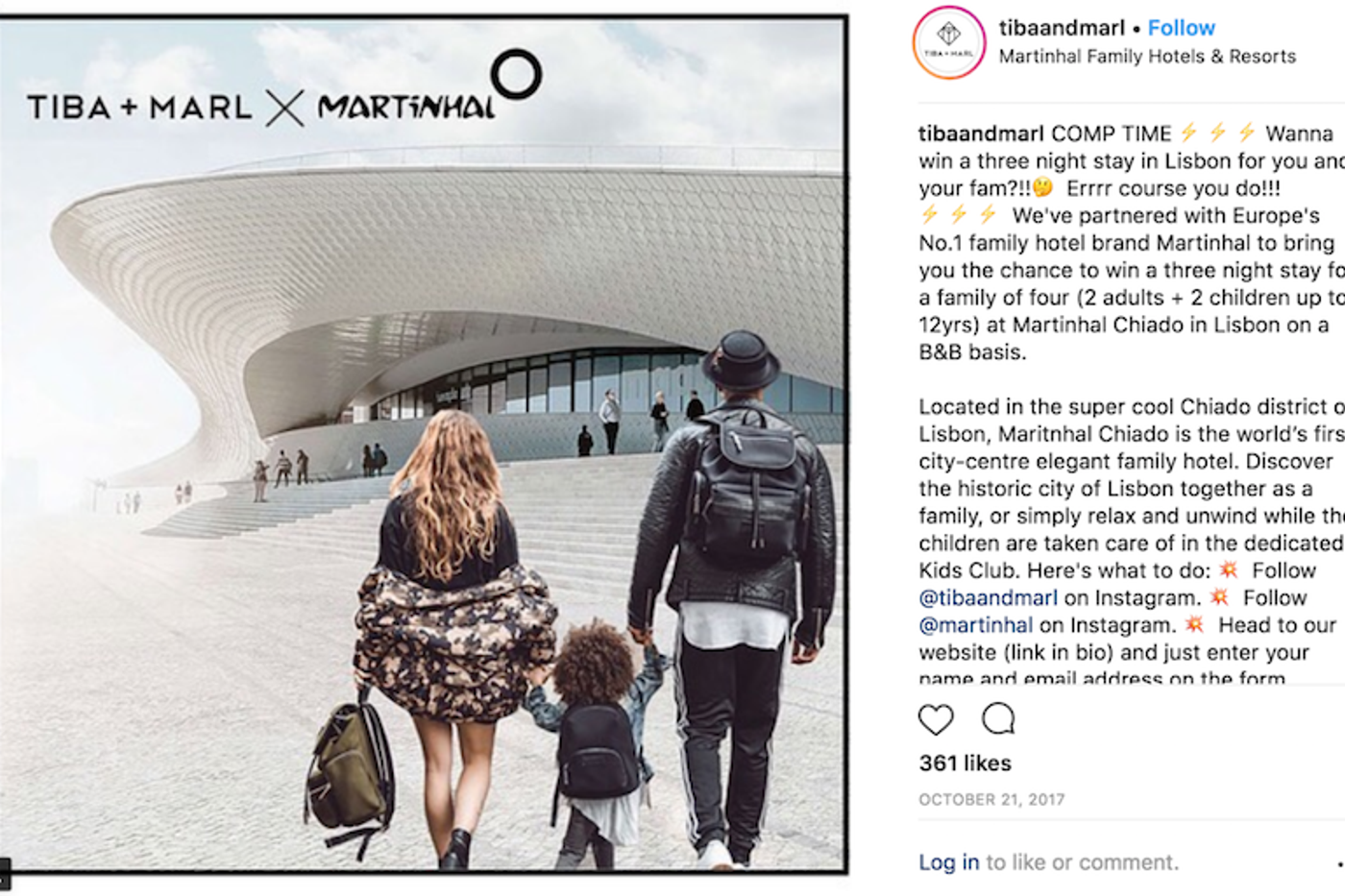Sometimes in life, together really is better. That’s definitely true when it comes to like-minded brands collaborating in the luxury hospitality space.
What is a brand collaboration?
Let’s start with the basics. If you’re not familiar with what’s involved in brand collaborations, it’s where two like-minded brands, with an overlapping core audience, team up and work together to create a marketing partnership.
Brand Collaborations (also called brand partnerships) are all around us; fashion brand Alexander Wang once teamed up with high-street store H&M on a hotly-anticipated capsule collection, beauty brand Clinique has partnered with Crayola to create a fun range of custom lipsticks, and taxi-app Uber has partnered with music-sharing site Spotify on a range of custom playlists.
From beauty products to cars, to high fashion, brands with a shared vision are partnering up on some really creative campaigns.
Now, I know what you’re thinking:
“I’m running a luxury hotel, not peddling lipsticks or selling t-shirts… how could brand collaborations work for me?”
Stick with me, I’m going to explain.
How brand collaborations can work for hotels
With brand collaborations, there is no one-size-fits-all solution. The possibilities for collaborations really are endless, and often the best brand collaborations are multi-layered using multiple different techniques to reach and engage each party’s audience most effectively. What’s fun about this is that collaborations give you an opportunity to get creative and experiment with different tactics to see what works best for you.
Let’s explore six of the most common types of collaboration tactics – for example’s sake, let’s say you’re a luxury beach hotel trying to tap into the millennial market, and you’ve (wisely!) decided to collaborate with that “hot-new-swimwear-brand” that all the 20 and 30 somethings are talking about. Here’s a very top line overview of different tactics you could employ, either individually for smaller collaborations, or as part of a bigger, multi-faceted campaign:
1. Social Competitions:
“Hot-new-swimwear-brand” runs a competition on their social media feeds offering a weekend away at your luxury beach hotel to the lucky winner. To enter the competition users need to follow and engage with your brand’s social account.
2. Flyers:
Every time a trendy millennial buys a bikini from “hot-new-swimwear-brand”, they’ll receive a flyer containing a tempting offer from your luxury beach hotel.
3. Pop-ups:
“Hot-new-swimwear-brand” runs a pop-up boutique at your luxury beach hotel promoting the location in the run-up-to, during and after the boutique to their community of loyal followers.
4. Retreats:
“Hot-new-swimwear-brand” uses your luxury hotel as the venue for a week-long retreat for trendy millennial customers.
5. Newsletter marketing:
“Hot-new-swimwear brand” shares a deal or ‘value add’, such as a complimentary spa treatment at your luxury beach hotel.
6. Photoshoots:
“Hot-new-swimwear brand” shoots their latest collection at your luxury beach hotel, crediting you in the pictures.

These summarise the most common collaboration tactics, but the list is by no means conclusive and it’s really important to remember that these ideas aren’t mutually exclusive. In fact, the best brand collaborations will often be a combination of several of the above tactics – it’s best to experiment and find a collaboration that really works for you, your hotel’s brand and helps you reach and engage with the right target audience.
What should I think about when considering a collaboration?
Here are my top tips for pulling off a successful brand collaboration:
Abort a collaboration if it’s not mutually beneficial
If your chosen brand is asking a lot, but you’re unsure exactly what you get out of it, this doesn’t bode well for a successful collaboration. For example, if your collaboration partner is asking for a week’s holiday at your resort as a prize for a competition, and all you get in exchange is a mention in their newsletter, you need to ask some serious questions about the value of the collaboration for your brand.
For strategic alliances to truly work, the two brands need to share the same brand values, target audiences, promotion channels and there needs to be a clear win-win.
Think about data capture.
If you’ve set up a fantastic competition and 10K customers enter, unless you agreed data capture beforehand, the email addresses of those individuals are lost to you forever. Savvy brands always agree on data capture before embarking on a collaboration, which means each entrant will have to tick a box allowing your hotel brand to contact them in the future.
In light of the new legislation which came into force in Europe in May 2018, make sure you handle this data sensitively and are GDPR compliant if participants in the campaign could be located in the EEA.
Start small and experiment.
Brand collaborations might seem scary, but there really is no right or wrong way to do them (providing you follow the two initial tips above, of course!)
Start with something small, like some newsletter marketing and evaluate the ROI you get from the campaign. If it works, then you’re in a better position to expand; in no time you’ll be hosting pop-ups, photoshoots and retreats at your luxury hotel!
What are the benefits of brand collaborations or partnerships?
If you’ve followed the tips above and only pursue mutually beneficial partnerships, I’m confident you’ll come out of the collaboration better off than before you started.
The benefits of the collaboration will be specific to the campaign and your individual hotel, but here are three benefits you’ll likely come across:
1. They’re cost effective
Hypothetically, two brands can team up without a single penny changing hands. For instance, “hot-new-swimwear-brand” from our previous example could host a photoshoot at your hotel for free, in exchange for social media coverage during the shoot and location credit in resulting photos. In this way, both brands benefit from reaching the other’s audience, without anyone having to reach for their wallet.
This was the case in a brand collaboration we facilitated last year between Tiba + Marl and our family-friendly luxury hotel client, Martinhal.
Martinhal’s goal was to reach the affluent millennial parent, so we arranged a brand collaboration with trendy changing bag brand, Tiba + Marl.

We arranged a social media competition, which offered a weekend break at Martinhal to one lucky winner, subject to them following both brands on social media and providing their email address via a dedicated landing page. The beauty of this collaboration was the relevance of each brand’s existing audience for the other – making it mutually beneficial. Similarly, the focus on this campaign was quality over quantity. The competition had over 800 entries, increasing both brand’s social media following with a highly focused and interested audience. This meant Martinhal was equipped with 800 new email addresses to add to their database of targeted and engaged affluent millennial parents, theirs to contact for future marketing campaigns.
2. They can help you beat those pesky algorithms
As you may know, social media channels such as Facebook and Instagram constantly change their algorithms, making it harder for brands’ organic posts to be seen. Social media competitions — one of the main types of brand collaborations — are a great way to reach a wide audience without promoting (paying) for posts. As in the example from Martinhal above, ensure the brand you’re collaborating with is receiving high levels of relevant, organic engagement and you’ll be on to a winner.
3. They’re a chance to reach relevant, untapped audiences
If you’re trying to tap into a new audience or expand into a new market, brand collaborations are a great way to quickly build your database.
As shown above, a carefully considered social media competition could increase your following among a new target demographic quickly, and a positive association with an on-trend or reputable brand amongst a specific market could pay dividends for your luxury hotel.
We definitely found this the case with an offline collaboration we organised for our client, Forsthofalm, an active alpine wellness hotel. With a fantastic vegan menu and wellness ethos, their goal was to both increase awareness of this offering among the UK vegan market, and drive bookings to the summer months outside of their busy ski-season.
We helped them to establish a brand collaboration with The Vegan Kind, a vegan subscription box service which sends vegan food and beauty products to subscribers.
We arranged to insert a flyer with a tempting competition offer into every The Vegan Kind customer’s subscription box.
With over 3,000 relevant subscribers receiving a box, this helped to raise Forsthofalm’s profile as more than just an Alpine ski resort amongst a vast, yet highly targeted audience of vegan travellers who shared in Forsthofalm’s core values. The terms and conditions of the competition also meant Forsthofalm could continue the conversation with these consumers, ultimately resulting in an increase of bookings toward the Summer season.
Can brand collaborations work for Ultra-Lux hotels?
solutely, as long as your brand values and target audiences align, and you employ the the right collaboration tactics to ensure you maintain standards of luxury and exclusivity. These were the considerations we had to take when we helped facilitate a collaboration for Lanserhof’s Medical Clinics, who appeal to the ultra-high-end market. Any brand they collaborated with needed to be tailored, it needed to be luxurious and it needed to be exclusive to fit into the Lanserhof brand story.
Haircare brand, Wella, would not initially seem to meet some of these requirements; the price point is low, the brand is global and the products are mostly ‘off-the-shelf’. None of these things particularly align Wella with Lanserhof’s brand image.
However, their new range which they were due to launch was different. System Professional and their new process ‘Energy Coding’ was a brand new type of shampoo that was tailored specifically to individual’s hair DNA. It was therefore extremely exclusive, luxurious and had the higher price-point to match – and fit well with Lanserhof’s focus on bespoke health and self-care.
“Since every person has a different type of hair, it needs an individual hair care. By diagnosing the personal hair energy profile, the new proccess “Energy Coding” can find a solution (your individual enegry code) out of 174 million possible combinations.”
– Caro Daur, high fashion & beauty blogger in attendance
Lanserhof Tegernsee hosted the launch of the product, inviting journalists, hair experts and celebrities to get the first insight into the new shampoo. The event, which lasted over two days, gave attendees the opportunity not only to experience Wella System Professional, but to also experience an overnight stay at Lanserhof. There were talks both from hair experts and Lanserhof’s own medical experts, the food was that from the Lanserhof menu and Lanserhof’s celebrity ambassadors, Poppy & Chloe Delevigne, also attended to promote the collaboration.
So, how do I choose the right brand to partner with?
It’s best to think about your hotel’s specific goals, and then work backwards to pick a brand and/or type of collaboration which will help you hit those goals.
For example, if you’ve just launched a yoga programme at your luxury hotel, you might want to collaborate with a cool yoga-wear brand on a retreat or pop-up. Or, if your hotel is full-to-bursting in summer, but struggles with occupancy in the cooler months, you might want to team up with a fashion or accessories brand and insert a ‘winter sun’ offer into their online orders, thus driving bookings to the low and shoulder seasons.
A good PR agency will be able to guide you in choosing a brand which fits your hotel’s unique objectives.
At Lemongrass Marketing, we have considerable experience of organising successful brand collaborations: from the initial research, to organisation, execution and analysis of the results. If you’d like to discuss how brand partnerships could help boost the profile of your luxury travel brand, please email grow@lemongrassmarketing.com.

